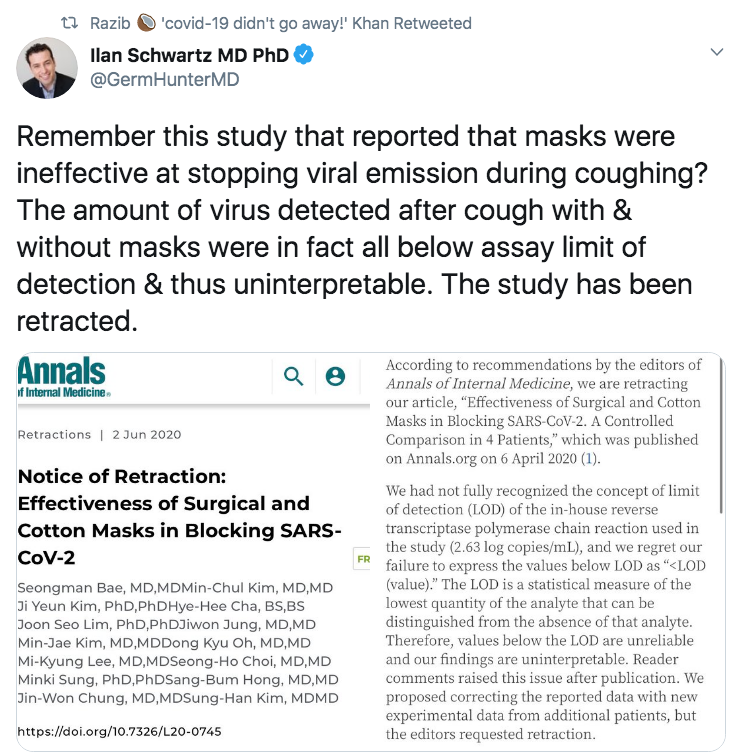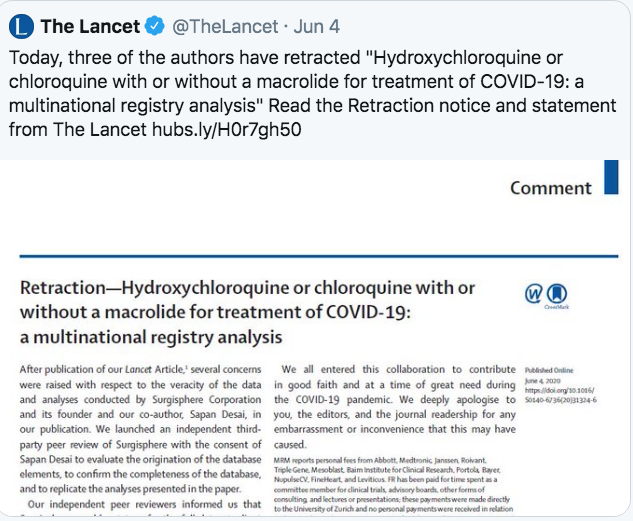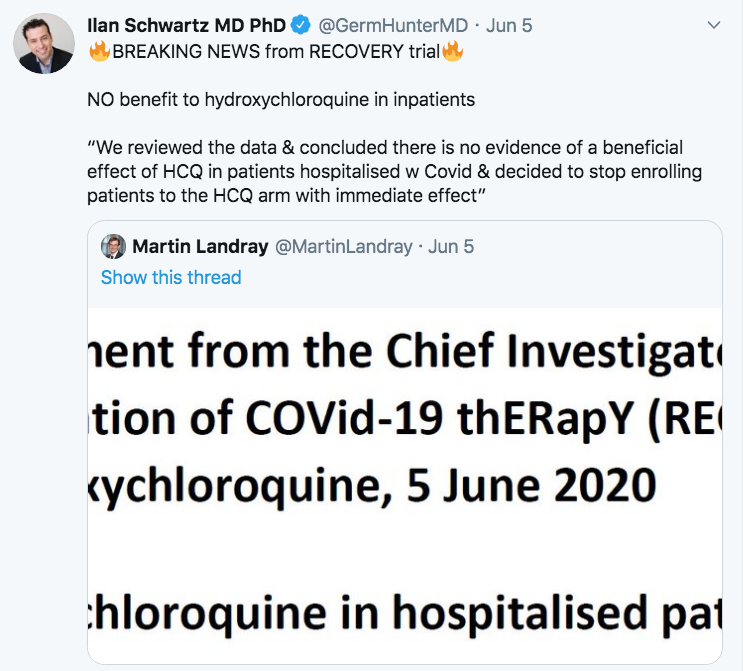A week in the wonderful world of medical research
First a comment on the previous post. The title was supposed to be half sarcastic, a poor choice on my part. (Be 100% sarcastic or not at all.) Obviously the economy is still in really bad shape, and we are not out of the woods yet. But it’s not as bad as I had feared a month ago.
All the following tweets are from the past three days. The study that claimed masks don’t work has been retracted:

Ditto for the study that claimed hydroxychloroquine is dangerous:

But it still doesn’t work:

And I hope this is another bogus study:
The Morbidity and Mortality Report came after news that poison control centers have received increased calls regarding exposure to bleach and other cleaning products during the coronavirus. To learn more, the CDC conducted an online survey of more than 500 adults over the age of 18. While the group seemed informed on topics like hand-washing and how to use personal protective gear, many were unsure about how to correctly use disinfects — and revealed partaking in dangerous practices.
Specifically, the CDC found that 39 percent of the survey respondents had “engag[ed] in at least one high-risk practice not recommended by the CDC for prevention of SARS-CoV-2.” Among them, 19 percent had used bleach on food items, 18 percent had used household cleaning products on the hands or skin, 10 percent had “misted their body” with a cleaning or disinfectant spray, six percent inhaled vapor from household cleaners and four percent had either ingested or gargled “bleach solutions, soapy water and other cleaning … solutions.”
HT: Razib Khan
Tags:


6. June 2020 at 09:13
It was FDR’s campaign song during the middle of the Great Depression, so it seemed apt
6. June 2020 at 14:47
Masks work or not.
Chloroquine works or not.
Lockdowns work or not.
The Wuhan virus is a lab Frankenstein or not.
Carry on.
6. June 2020 at 15:21
OT– over at econlog, where I am band, Scott Sumner posits that Japan’s national debt has perhaps become a burden, requiring either tax increases or decreases in publicly-funded benefits.
And sure enough, Japan has repeatedly raised its national sales tax in recent years.
My gut tells me that high national debts are a bad idea.
On the other hand, the interest rate on Japan’s 10-year bonds is 0.1%. Also, the Bank of Japan has bought back half of that nation’s national debt, and interest on national debt just flows back into the national budget. Call it Mobius-strip economics.
Something is going on in the US, Japan, and Switzerland that defies explanation by orthodox economics.
6. June 2020 at 17:45
It turns out that real medical science is too slow and boring for Americans. We demand big, sexy results before the next ad break. But real life doesn’t work that way. This is why going off half-cocked and musing about potential medical treatments on national television is a bad idea.
HCLQ probably wasn’t going to work, because 99% of drugs weren’t going to work. But because the president felt like running his mouth and juicing the stock, doctors were coaxed into issuing prescriptions, federal agencies spent weeks trying to clean up the mess, research funds and efforts were misdirected, people ended up poisoning themselves, and people are still spouting nonsense claiming that it’s a miracle cure. If Trump thinks he has a brilliant idea, he can talk it over with Birx or Fauci behind closed doors, not in front of the damn cameras.
On masks, the situation is completely different, because the cost of buying and wearing a mask is basically nothing. Unlike HCLQ or any other drug, there isn’t a danger of overdose or complications. And the mask debacle speaks to our stupid response to everything these days. People want a black & white, miracle cure. But reality is much more dull. Our response to a health crisis should be to deploy as many low-cost tools as possible: masks, distancing, avoid large indoor crowds, wash your hands, etc. Then, if it turns out something doesn’t really help, you can just stop doing it. After a couple months study, it seems like being outside is very effective at reducing transmission. Gathering in large groups is probably still not great (whether you’re protesting to get a haircut, or to not get murdered by the police), but we can probably lay off the pearl-clutching about friends hanging out in the park.
That is the boring truth of how you stop disasters. In air travel and utilities it’s known as defense-in-depth. You never count on some hot-shot pilot, or a heroic industrial worker, you instead use multiple lines of defense. The objection to masks was dumb from the start, and even now I’m hearing people object saying that handkerchiefs are only like 70% effective. Yeah, if you’re distancing, and wearing a face covering, and you’re washing your hands, and if each of those things is reducing your exposure by 70%, then you’ve now reduced your risk by 97%.
6. June 2020 at 18:44
Best of luck with that hope of yours.
6. June 2020 at 19:00
Bob, I completely agree about defense in depth. I’ve made similar arguments in some other posts.
6. June 2020 at 19:12
I do not fully understand the motivation behind these fakes. I also wonder how often this happens. I am afraid quite often, unfortunately.
I suppose one motivation might be that quite a few people love conformity, so they fabricate results that the majority expects anyhow.
7. June 2020 at 00:43
Scott,
what Bob said, not just about multiple lines of defence but also about the reasons for the bad research being published. Research always takes time and there is no time now, so a lot of things get published, probably in good faith, that really could have used more criticism. Eben the best peer reviewed research often does not stand up to time, especially when about population-wide effects with many confounders and small effect sizes. Suffice to say that neither Hydroxychloroquine nor masks for that matter, seem to have a knockout effect, by yes masks at least aren’t very expensive of harmful, and will likely have a contributing effect.
I just really hope the mad rush for a vaccine doesn’t land us with something like a “28 days later” scenario.
7. June 2020 at 06:40
Masks: Wearing a mask (other than N-95) doesn’t protect the mask wearer, it protects others from the mask wearer. That truth, if broadly known, would make mask wearing rare: indeed, one is taught by economists no less (or more) that one should maximize one’s own well-being not the well-being of others. This has made discussion by economists of the subject of mask wearing highly fraught. And highly ambiguous. Does an economist deny the first rule of capitalism (please thyself) or science (masks don’t protect the wearer). So we get gibberish to mask the mask debate.
7. June 2020 at 07:12
mbka, Yes, in academia there is subtle pressure to publish questionable results. Tenure and salary is based on number of publications. It happens every day in economics as well.
Rayward, You said:
“Wearing a mask (other than N-95) doesn’t protect the mask wearer, it protects others from the mask wearer.”
That’s false; studies show some protection, not 100%.
I wear a N95 mask, btw.
7. June 2020 at 11:37
@Rayward,
I disagree. I think more people would wear masks if they knew, and knew that everyone around them knew, that the mask was intended to protect others. I think there is plenty of evidence that people are very motivated by social signaling. Most of the people I know who wear masks understand that they do so to protect others. And I’ve read that many who do not consider it a sign of bravery or manliness.
Personally, I wear a surgical mask for walking, jogging and biking, mostly for signalling. I wear an N95 when I venture into a store to protect myself.
7. June 2020 at 15:16
That’s my impression, too.
The leading German corona expert said that before the crisis he had to read two corona papers in order to find one good result. Now he has to read over 100 papers in order to find one good paper, because so much junk is being produced right now.
This has nothing to do with science anymore. Are there no better ideas for incentives in order to get rid of this pseudo-science that we have now?
It is always claimed that our knowledge is supposedly doubling at a rapid pace. I assume that most of this supposed new “knowledge” is junk science.
It does not go well together that we have alleged duplication of knowledge at a rapid pace, but so little real progress at almost all levels.
I see this especially in the medical field. In Germany people do a dissertation because the patients expect the “doctor” to have such a title. The doctoral thesis itself is always junk science. The same applies to almost all medical professors. In order to be head physician at a good hospital, you need a professorial title, a habilitation, and what do you do for this? Junk science.
Give people the titles in another way, but leave us alone with millions of papers of pure junk science.
7. June 2020 at 19:59
Christian,
it’s a little more complex – nowadays it’s also impact factor and in combination, the H index for example, that are being used to asses a scientist’s “value”. But granted the German system for Habilitation is especially outdated, and internationally, I think no one is happy either with the state of how research is being “measured”. No matter which dimension you take, rewarding quantity, risking bad science, vs rewarding quality, risking slow science; reward of novelty, risking jumping the guns, vs reward of consistency and replicability, risking research that’s too conservative; reward of independence through tenure vs reward of accountability through contract terms: Along each dimension you have possible perverse incentives cropping up. It’s a genuinely hard problem to solve. The replication crisis in the social sciences has done wonder there and some attempts at solutions are finally also ported over to the hard sciences, such as pre-registrations.
But during times of Corona, it all falls back to default.
Also see everything written by Ioannidis.
8. June 2020 at 08:35
The supply of capable researchers is much more constrained than the supply of credentialed researchers. For the latter, Say’s Law is a particularly unfortunate side effect, because it means that the “market” for research gets flooded with lots of useless information, which, in turn, makes development of high quality information more difficult.
9. June 2020 at 12:50
mbka,
I must admit that your explanations are more precise, more knowledgeable, and more sophisticated.